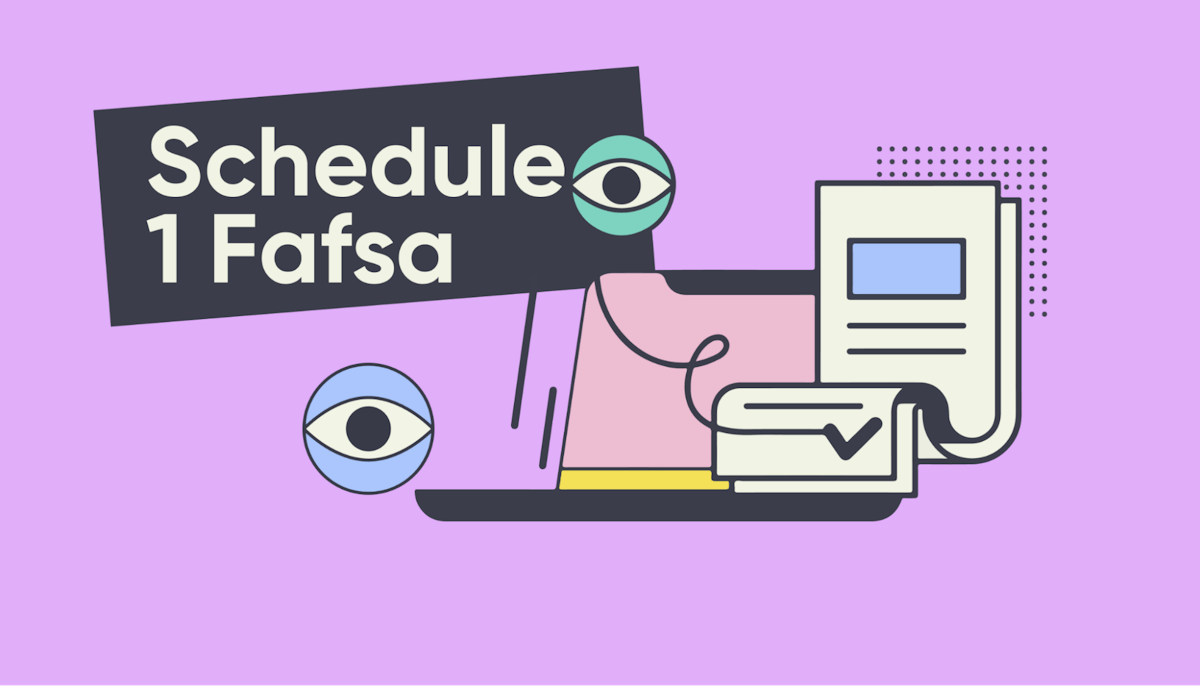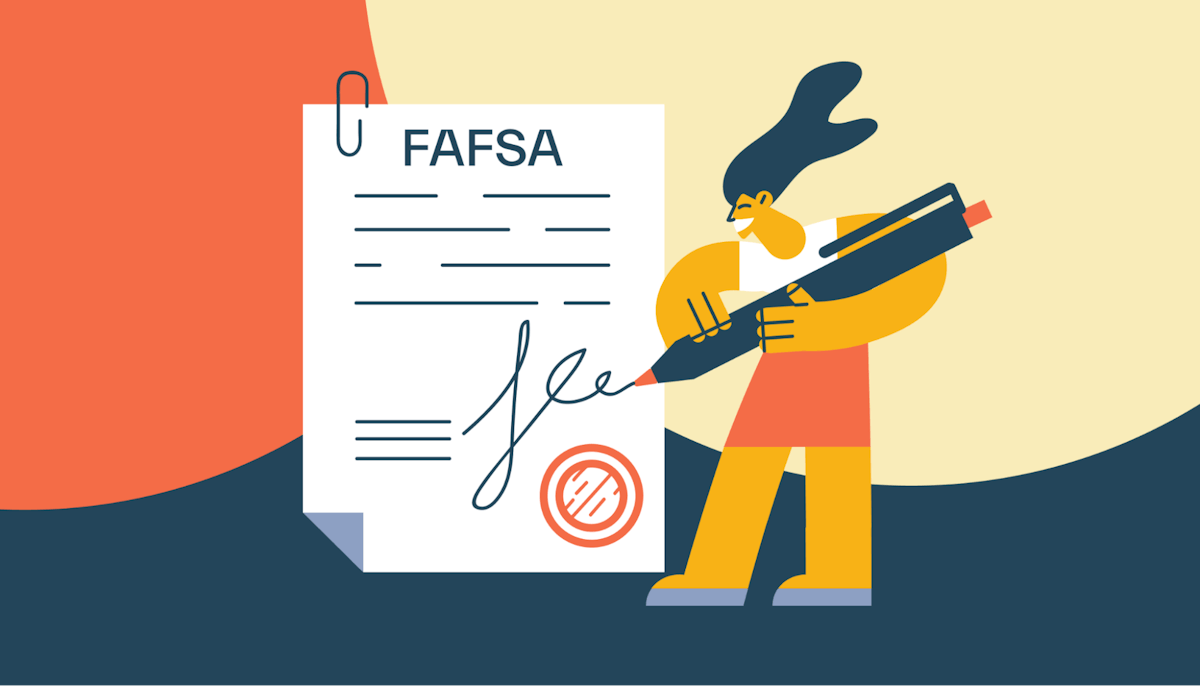Financial aid •
October 28, 2022
University of North Carolina Wilmington (UNCW) financial aid: a complete guide
Read all about financial aid at the University of North Carolina Wilmington, including scholarships, loans, and grants.
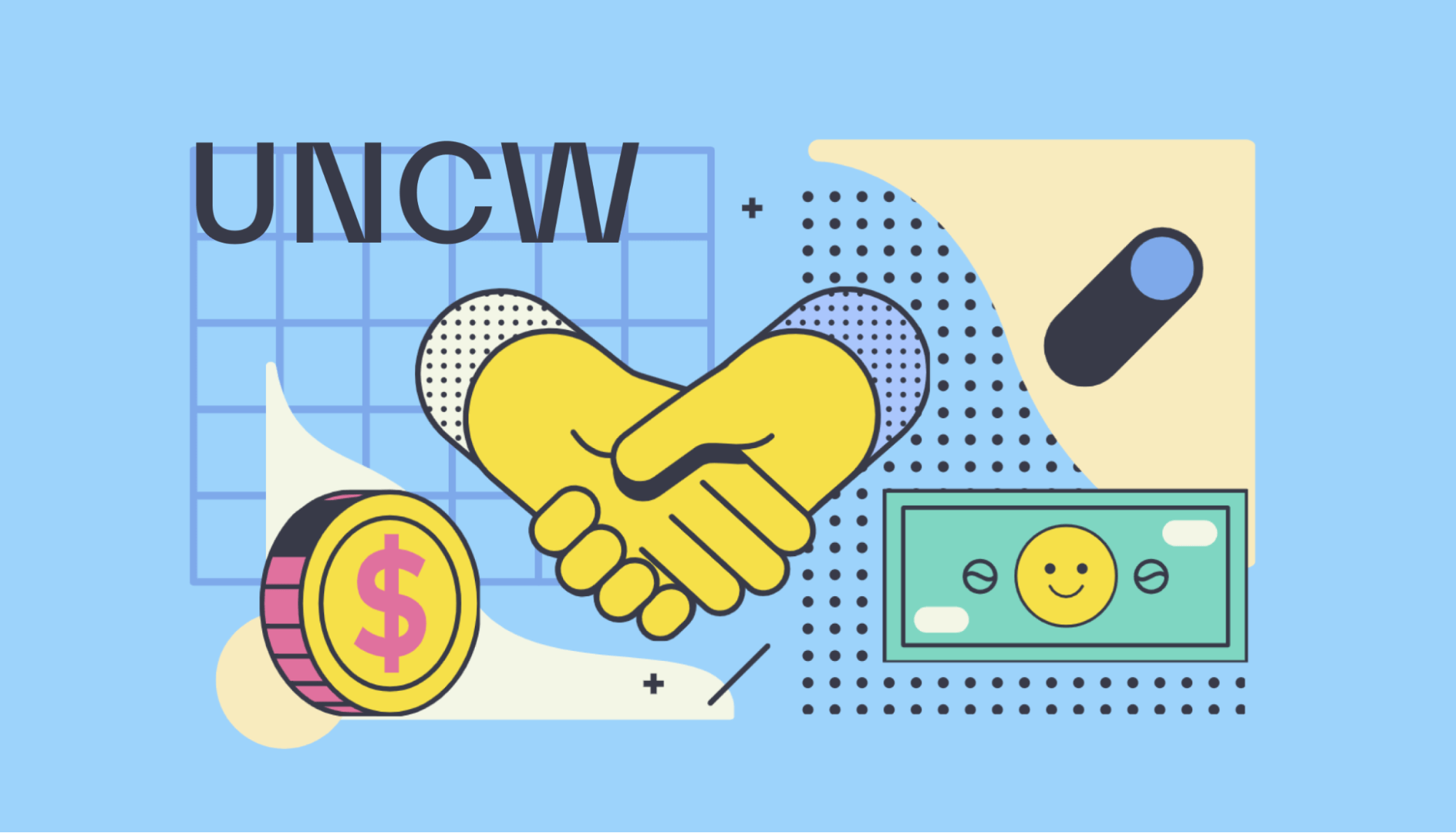
The University of North Carolina Wilmington is a North Carolina public research university. Located in Wilmington, NC—right near the NC coastline—it’s one of 17 schools in the University of North Carolina System.
If you're interested in applying to UNCW but wondering how you'll pay for it, we've got you covered.
Let's look at the facts below.
A snapshot look at University of North Carolina Wilmington
UNCW was established in 1947 as Wilmington College. In 1955, it was elevated to university status and officially became the fifth UNC campus.
UNCW enrolls about 17,915 students—14,650 of those are undergrads.
As an undergraduate student, you can pick from around 55 undergraduate degree programs spread across many colleges:
College of Arts and Sciences
Cameron School of Business
College of Health and Human Services
Watson College of Education
Graduate School
Honors College
University College
UNCW is one of three UNC schools that made the US News & World Report’s ‘Top 100 Public National Universities’. It’s considered one of the best colleges with great first-year experiences!
Ranking: 187 (national universities)
Size: 17,915 (total); 14,650 (undergraduate); 3,265 (graduate)
Demographics: 13,808 (white), 1,303 (Hispanic), 991 (Black), 337 (Asian), 98 (American Indian or Alaska Native); 11,665 (female), 6,250 (male)
Tuition: $7,318 in-state; $21,871 out of state
Acceptance rate: 65.5%
Average GPA of accepted student: 4.01
Key dates and deadlines (2021)
Application: November 1 (early action), February 1 (regular)
Financial aid deadlines: Financial aid deadlines: April 1 (FAFSA priority), June 30 (FAFSA regular)
A look at scholarships offered by UNCW
Scholarships are a great way to cover tuition, books, and other attendance costs at UNCW. You usually don’t have to pay scholarship aid back—the money is yours to keep, helping you lower the amount of student debt you’ll have after you leave!
As a UNCW student, you can apply for scholarships using UNCW’s scholarship application. This application automatically matches you to merit and need-based scholarships you’re eligible for. You can apply as of December 1 of the year before you want to attend. March 1 is the deadline for undergrads, and graduate students have until June 1 to apply.
UNCW awards a small number of merit scholarships to freshmen and transfer students separate from the scholarship application opportunities. Recipients are picked based on their admissions applications.
UNCW scholarship awards range from $500 to the entire cost of UNCW tuition and fees, books, and supplies. The average scholarship amount is $2,500.
Outside scholarships are available as well. You can find scholarships from local businesses and community organizations. They may offer smaller awards, but every bit helps. If you look carefully, you can find awards for pretty much anything!
However, UNCW asks you to inform them of any outside scholarships awarded to you. For more on which scholarships you can apply for and how Mos can help, check out our financial aid tips and tricks.
Student loans
Student loans are another way to cover UNCW’s cost of attendance.
Keep in mind that you have to pay back your loans, plus interest. You usually won’t start paying your loans back until you leave school, but some loans may require repayment while in school. UNCW’s financial aid department offers plenty of information about student loans on its financial aid website.
One of the most common student loans is the Federal Direct Loan. These come from the federal government, and they can either be subsidized or unsubsidized:
Subsidized: The loan won’t start collecting interest doesn’t until you leave school and a 6-month grace period ends. It also won’t collect interest if you defer your attendance.
Unsubsidized: Your loan will start collecting interest right after you take it out.
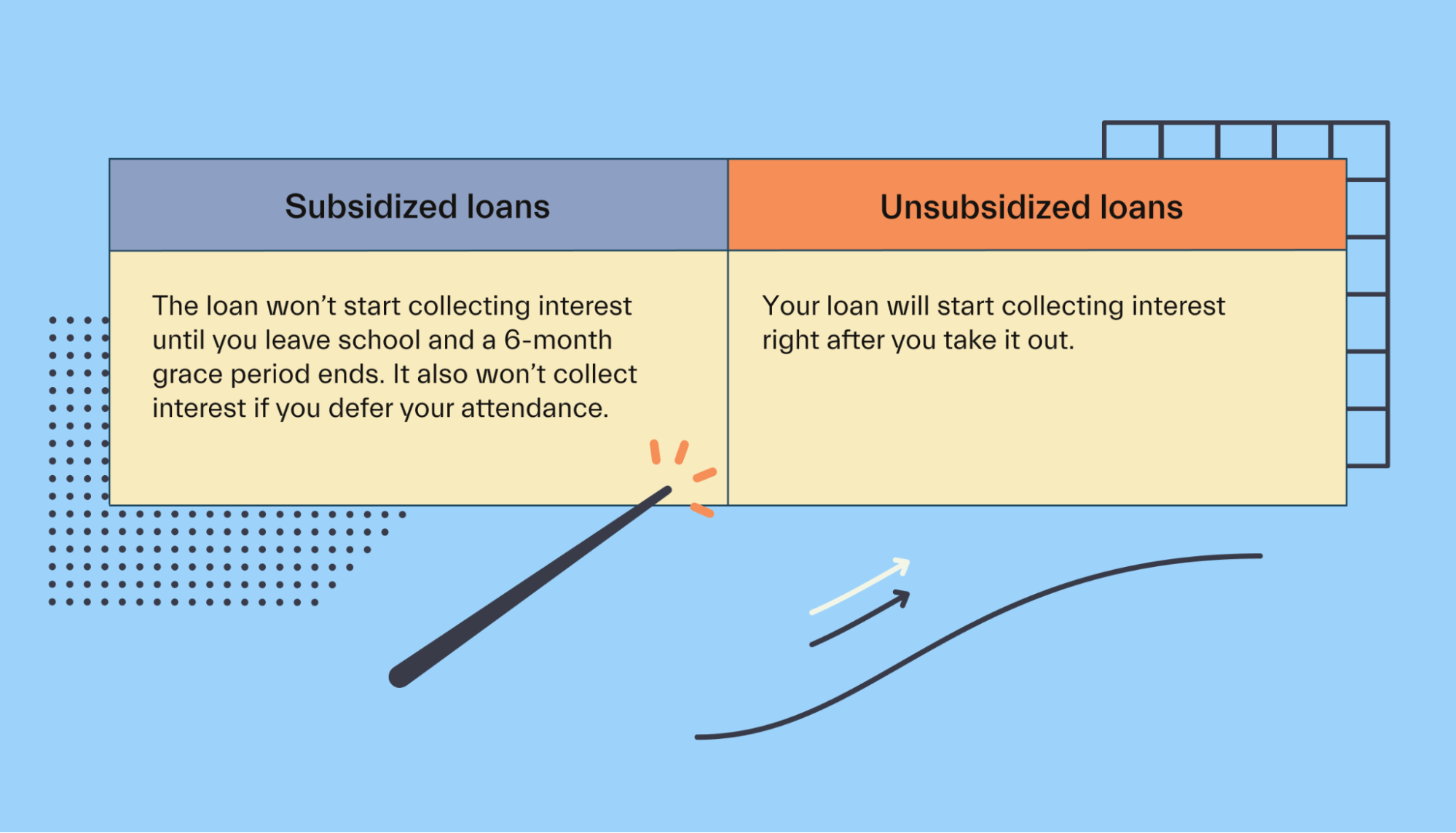
Neither requires payments until a 6-month grace period after graduation ends, though. If federal loans don’t cover everything, you can also take out private loans.
These tend to have higher interest rates and fewer protections than government loans, so be careful.
For more help finding the right student loan for you, check out Mos and work with an advisor who will help you find the best way to invest in your education.
FAFSA
Every student should fill out the Free Application For Federal Student Aid (FAFSA) as early as possible every year they attend college.
The federal government uses the info on this financial aid application to determine the amount of federal money you’re eligible for. This money can come in the form of loans, grants, and other types of aid.
You can fill out FAFSA starting on October 1 before the academic year you’d like to file for. The deadline is usually the last day of June of the year you’re actually in school.
For example, if you’re filing for the 2021–2022 academic year, you can apply starting on October 1, 2020. The deadline is June 30, 2022.
At UNCW, your chance of winning need-based scholarships also increases if you file the FAFSA by January 1 before the academic year you’re attending.
For more on applying for the FAFSA, including important dates and how to make sure your application is submitted successfully, head to Mos.com or download the Mos app.
UNCW financial aid FAQs
Here are some frequently asked questions (FAQs) about financial aid at UNCW:
What is UNCW’s cost of attendance?
UNCW is a public state school, so North Carolina residents pay less in tuition than out-of-state students.
UNCW estimates the following annual costs of attendance:
In-state: $25,812
Out-of-state: $39,920
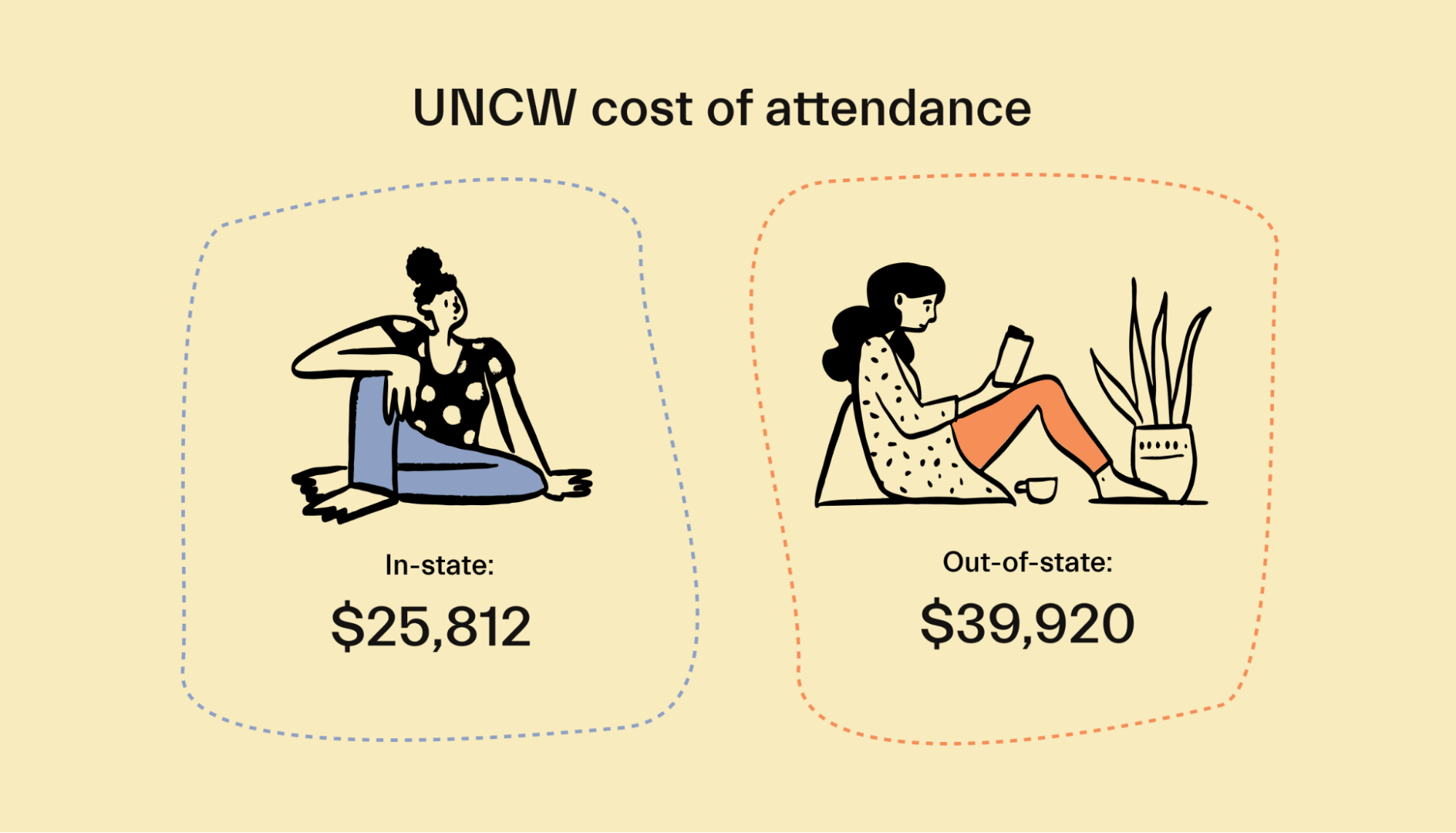
Of that number, $4,443 goes toward tuition for in-state students and $19,063 for non-residents. There are $2,795 of fees, and living expenses like housing, meals, transportation, and books make up the rest.
How do I get considered for a merit-based scholarship at UNCW?
There are two types of merit scholarships at UNCW.
One is awarded to no more than 5% of freshman and transfer students each year. Eligibility is based on the contents of your application, such as your GPA and test scores.
The other type consists of a variety of scholarships.
You can find these by filling out the UNCW scholarship application. This application matches you to any scholarship you’re eligible for. Then, you apply to those individually.
Filing the FAFSA by January 1 before the year you plan on attending can help your chances!
How does UNCW disburse aid?
UNCW applies your aid directly to your bill in your account.
You’re responsible for paying any leftover amount due or covering charges that post to your account later.
How do you qualify as a resident for UNCW?
UNCW offers lower tuition to residents of North Carolina. The Residency Determination Service is the entity responsible for classifications of residency for students.
In general, to be considered a North Carolina resident, students must:
Establish legal residence in the state
Maintain that residence for at least 12 months before term begins
Have “residentiary presence” in North Carolina
Intend to live in North Carolina permanently after finishing college
Is aid available for part-time students?
Yes, part-time students at UNCW can receive financial aid.
How many students get aid at UNCW?
On average, UNCW meets 48% of its students’ financial needs, providing aid to just under 50% of first-year students in fall 2020. The average need-based award to those students totaled $4,118.
How much student debt does that average UNCW student graduate with?
UNCW students graduate with an average of $10,231 in student debt. 39% of students left school with debt, meaning 61% of students leave school debt-free. This is lower than the national average. The typical college student leaves their university with $16,929 in debt.
Can I use private student loans to pay for UNCW?
Yes, if you need help paying for college, you can use private student loans to pay tuition, fees, or personal expenses while you study at the school.
Can out-of-state students receive financial aid?
Yes, out-of-state students at UNCW can receive financial aid, but they may be ineligible for North Carolina-specific grants, scholarships, and other aid programs.
How much do additional courses cost?
The total cost per credit hour at UNCW for residents is $417.46. Out-of-state residents pay $1,185.74 per credit hour. You can take additional courses if you are willing to pay the fee.
Universities like UNCW that you might be interested in
Want to attend school in North Carolina but don’t think UNCW is right for you? Here are some similar universities.
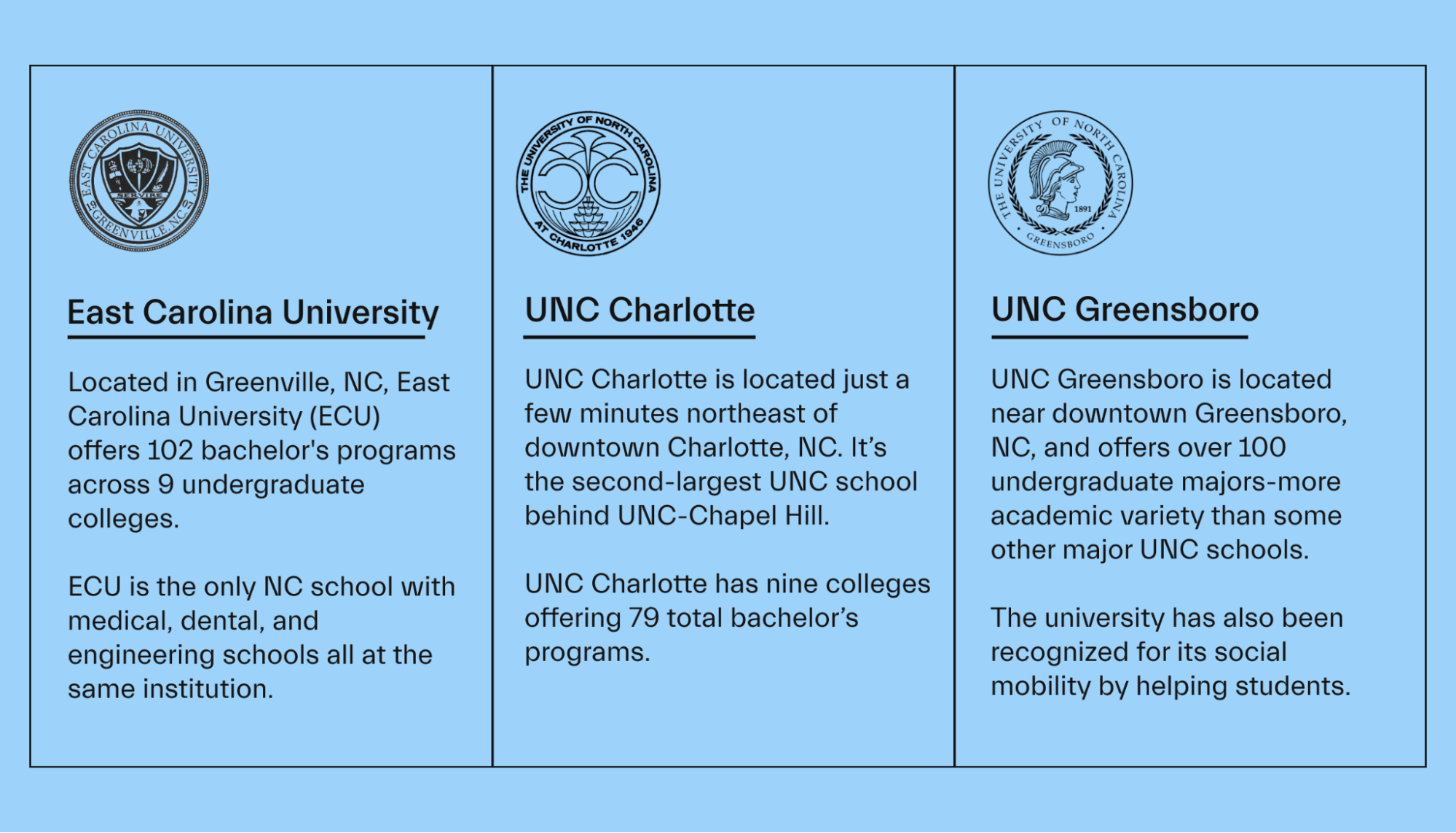
East Carolina University
Located in Greenville, NC, East Carolina University (ECU) offers 102 bachelor's programs across 9 undergraduate colleges.
ECU is the only NC school with medical, dental, and engineering schools all at the same institution. It’s also the top school in producing NC-practicing medical school graduates.
UNC Charlotte
UNC Charlotte is located just a few minutes northeast of downtown Charlotte, NC. It’s the second-largest UNC school behind UNC-Chapel Hill.
UNC Charlotte has 9 colleges offering 79 total bachelor’s programs.
Charlotte is home to many Fortune 500 companies, such as Bank of America, Microsoft, Wells Fargo. UNC Charlotte students are a short drive from tons of internship and job opportunities.
UNC Greensboro
UNC Greensboro is located near downtown Greensboro, NC, and offers over 100 undergraduate majors—more academic variety than some other major UNC schools.
The university has also been recognized for its social mobility by helping students—especially those from disadvantaged backgrounds—lower student loan debt while opening doors to great careers.
Conclusion
University of North Carolina Wilmington has plenty to offer, from its academics to its coastal location. Prospective students should consider both the academic programs available as well as the cost when deciding if UNCW is right for them.
If you’re looking for the best way to pay for school, Mos can help.
With Mos, you can get help negotiating for more financial aid, apply for hundreds of scholarships and grants with ease, and even get help with writing scholarship essays.
To get started, check out Mos or download the app today.
Let's get
your money
- Get paired with a financial aid expert
- Get more money for school
- Get more time to do you




